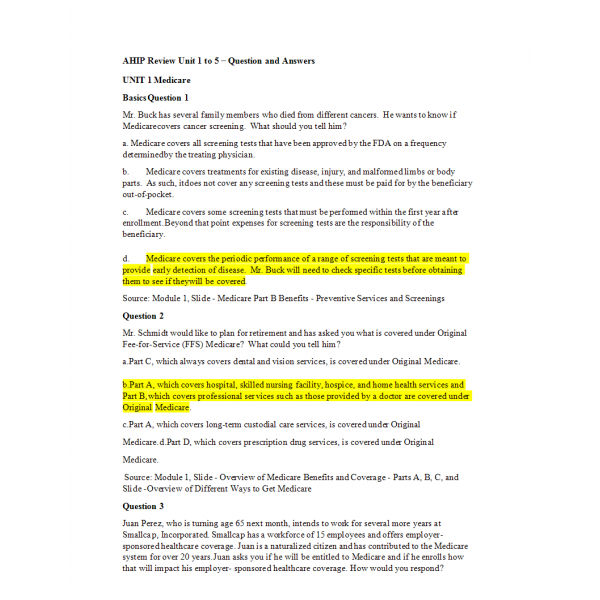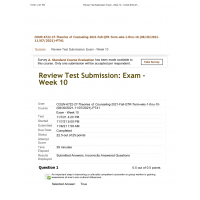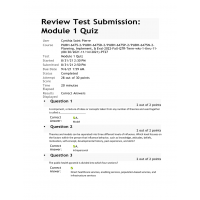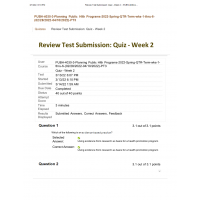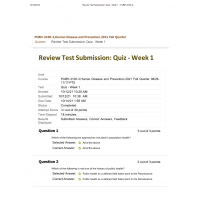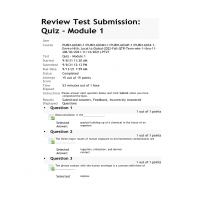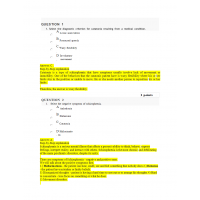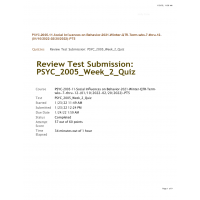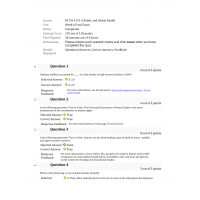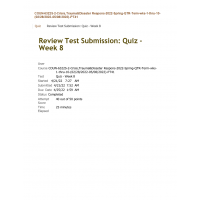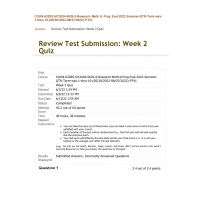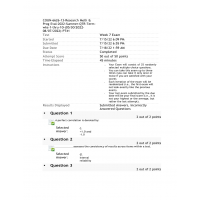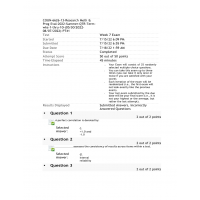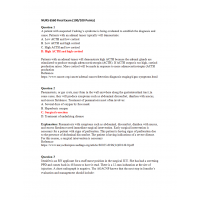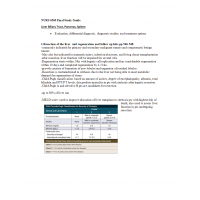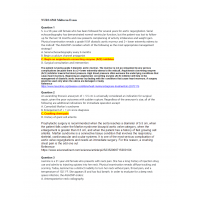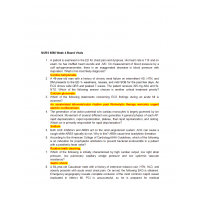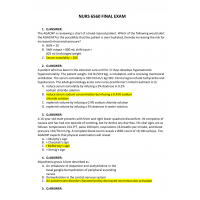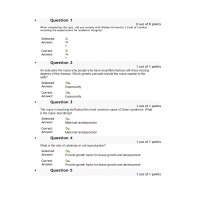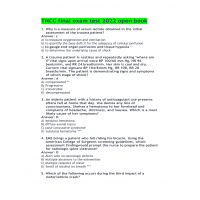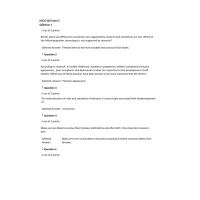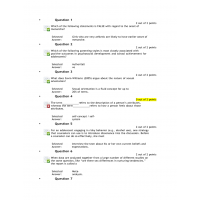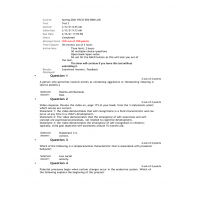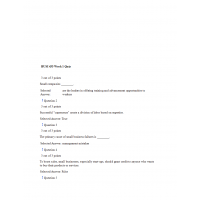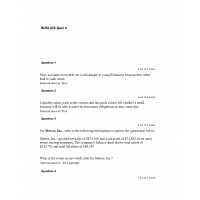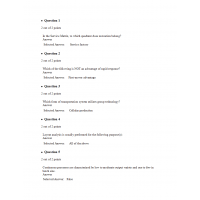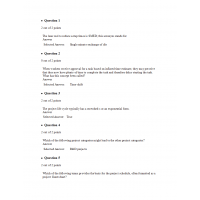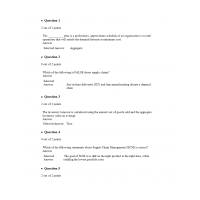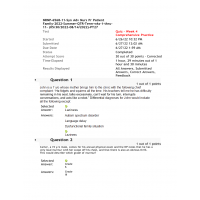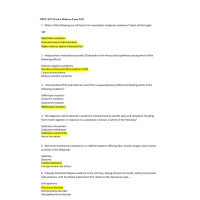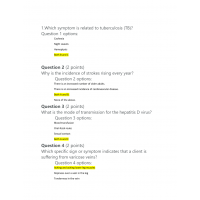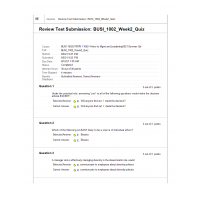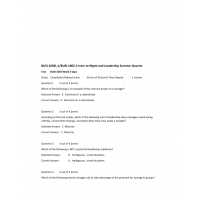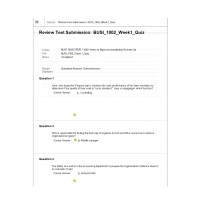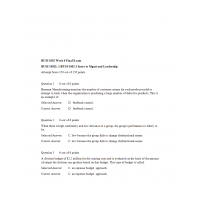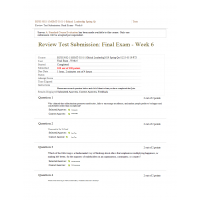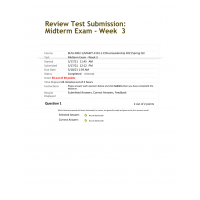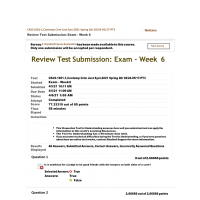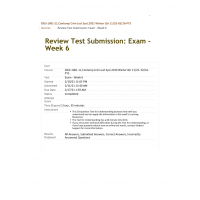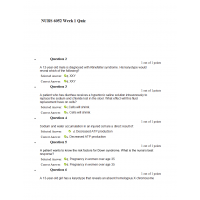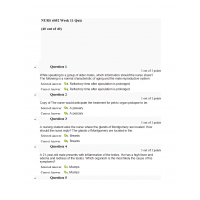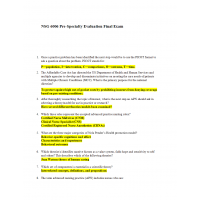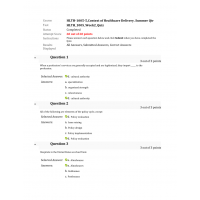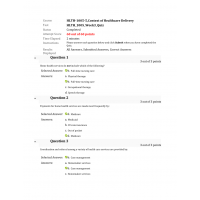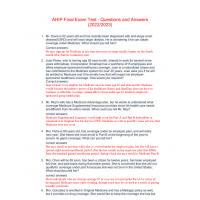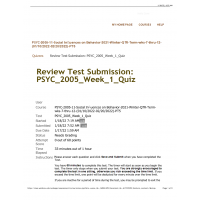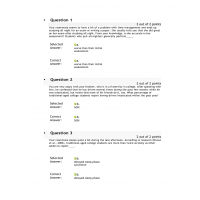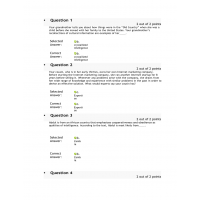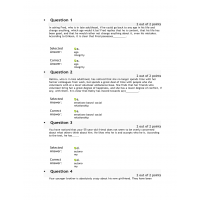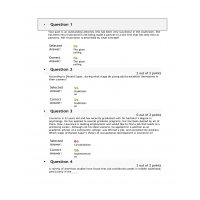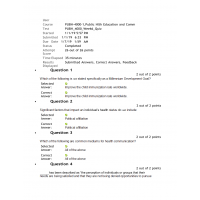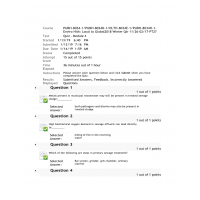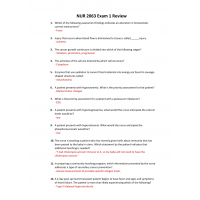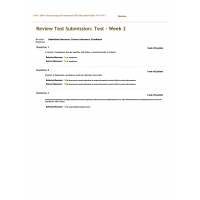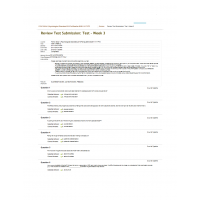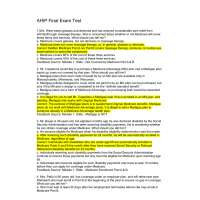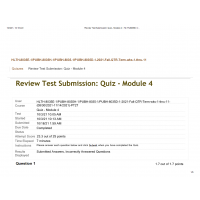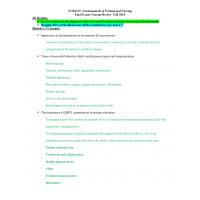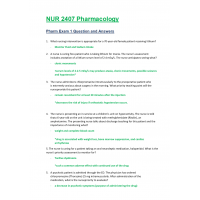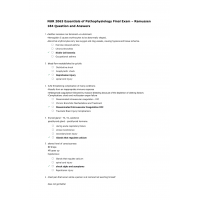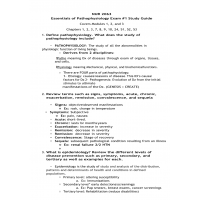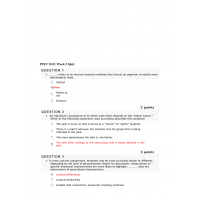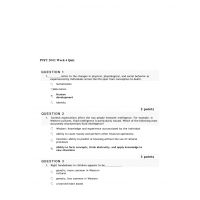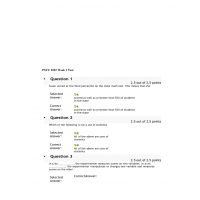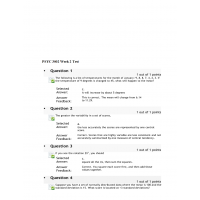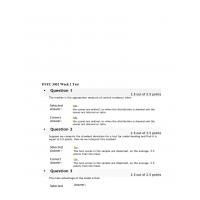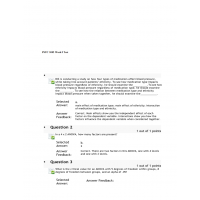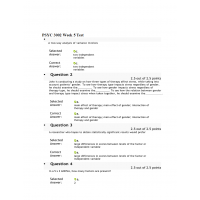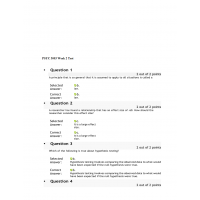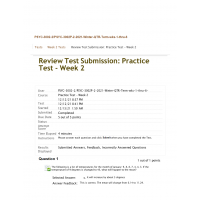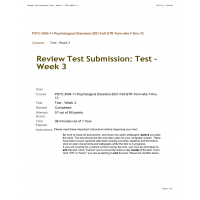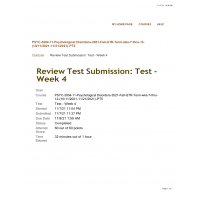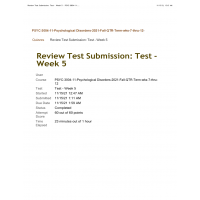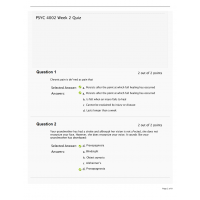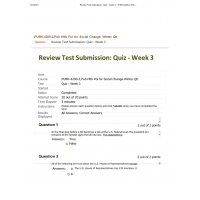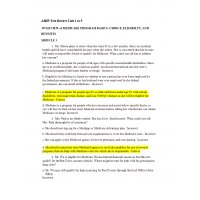AHIP Review Unit 1 to 5 – Question and Answers
UNIT 1 Medicare Basics
1. Mr. Buck has several family members who died from different cancers. He wants to know if Medicare covers cancer screening. What should you tell him?
2. Mr. Schmidt would like to plan for retirement and has asked you what is covered under Original Fee-for- Service (FFS) Medicare? What could you tell him?
3. Juan Perez, who is turning age 65 next month, intends to work for several more years at Smallcap, Incorporated. Smallcap has a workforce of 15 employees and offers employer-sponsored healthcare coverage. Juan is a naturalized citizen and has contributed to the Medicare system for over 20 years. Juan asks you if he will be entitled to Medicare and if he enrolls how that will impact his employer- sponsored healthcare coverage. How would you respond?
4. Mr. Bauer is 49 years old, but eighteen months ago he was declared disabled by the Social Security Administration and has been receiving disability payments. He is wondering whether he can obtain coverage under Medicare. What should you tell him?
5. Ms. Moore plans to retire when she turns 65 in a few months. She is in excellent health and will have considerable income when she retires. She is concerned that her income will make it impossible for her to qualify for Medicare. What could you tell her to address her concern?
6. Mrs. Duarte is enrolled in Original Medicare Parts A and B. She has recently reviewed her Medicare Summary Notice (MSN) and disagrees with a determination that partially denied one of her claims for services. What advice would you give her?
7. Mr. Moy's wife has a Medicare Advantage plan, but he wants to understand what coverage Medicare Supplemental Insurance provides since his health care needs are different from his wife’s needs. What could you tell Mr. Moy?
8. Agent John Miller is meeting with Jerry Smith, a new prospect. Jerry is currently enrolled in Medicare Parts A and B. Jerry has also purchased a Medicare Supplement (Medigap) plan which he has had for several years. However, the plan does not provide drug benefits. How would you advise Agent John Miller to proceed?
9. Mrs. Pe?a is 66 years old, has coverage under an employer plan, and will retire next year. She heard she must enroll in Part B at the beginning of the year to ensure no gap in coverage. What can you tell her?
10. Mrs. Chen will be 65 soon, has been a citizen for twelve years, has been employed full time, and paid taxes during that entire period. She is concerned that she will not qualify for coverage under part A because she was not born in the United States. What should you tell her?
11. Mrs. Park is an elderly retiree. Mrs. Park has a low fixed income. What could you tell Mrs. Park that might be of assistance?
12. Mr. Davis is 52 years old and has recently been diagnosed with end-stage renal disease (ESRD) and will soon begin dialysis. He is wondering if he can obtain coverage under Medicare. What should you tell him?
13. Mr. Rainey is experiencing paranoid delusions and his physician feels that he should be hospitalized. What should you tell Mr. Rainey (or his representative) about the length of an inpatient psychiatric hospital stay that Medicare will cover?
14. Mr. Alonso receives some help paying for his two generic prescription drugs from his employer’s retiree coverage, but he wants to compare it to a Part D prescription drug plan. He asks you what costs he would generally expect to encounter when enrolling into a standard Medicare Part D prescription drug plan. What should you tell him?
15. Ms. Henderson believes that she will qualify for Medicare Coverage when she turns 65, without paying any premiums, because she has been working for 40 years and paying Medicare taxes. What should you tell her?
16. Mr. Patel is in good health and is preparing a budget in anticipation of his retirement when he turns 66. He wants to understand the health care costs he might be exposed to under Medicare if he were to require hospitalization as a result of an illness. In general terms, what could you tell him about his costs for inpatient hospital services under Original Medicare?
17. Mrs. West wears glasses and dentures and has enjoyed considerable pain relief from arthritis through massage therapy. She is concerned about whether or not Medicare will cover these items and services. What should you tell her?
18. Mr. Xi will soon turn age 65 and has come to you for advice as to what services are provided under Original Medicare. What should you tell Mr. Xi that best describes the health coverage provided to Medicare beneficiaries?
19. Mr. Capadona would like to purchase a Medicare Advantage (MA) plan and a Medigap plan to pick up costs not covered by that plan. What should you tell him?
20. Mrs. Gonzalez is enrolled in Original Medicare and has a Medigap policy as well, but it provides no drug coverage. She would like to keep the coverage she has but replace her existing Medigap plan with one that provides drug coverage. What should you tell her?
UNIT 2
1. Mr. Lombardi is interested in a Medicare Advantage (MA) PPO plan that you represent. It is one of three plans operated by the same organization in Mr. Lombardi’s area. The MA PPO plan does not include drug coverage, but the other two plans do. Mr. Lombardi likes the PPO plan that does not include drug coverage and intends to obtain his drug coverage through a stand-alone Medicare prescription drug plan. What should you tell him about this situation?
2. Mr. Barker enjoys a comfortable retirement income. He recently had surgery and expected that he would have certain services and items covered by the plan with minimal out-of-pocket costs because his MA-PD coverage has been very good. However, when he received the bill, he was surprised to see large charges in excess of his maximum out-of-pocket limit that included some services and items he thought would be fully covered. He called you to ask what he could do? What could you tell him?
3. Mr. Lopez has heard that he can sign up for a product called “Medicare Advantage” but is not sure about what type of plan designs are available through this program. What should you tell him about the types of health plans that are available through the Medicare Advantage program?
4. Mrs. Radford asks whether there are any special eligibility requirements for Medicare Advantage. What should you tell her?
5. Mr. Gomez notes that a Private Fee-for-Service (PFFS) plan available in his area has an attractive premium. He wants to know if he must use doctors in a network as his current HMO plan requires him to do. What should you tell him?
6. Mr. Sinclair has diabetes and heart trouble and is generally satisfied with the care he has received under Original Medicare, but he would like to know more about Medicare Advantage Special Needs Plans (SNPs). What could you tell him?
7. Mr. Wells is trying to understand the difference between Original Medicare and Medicare Advantage. What would be the correct description?
8. Daniel is a middle-income Medicare beneficiary. He has chronic bronchitis, putting him at severe risk for pneumonia. Otherwise, he has no problems functioning. Which type of SNP is likely to be most appropriate for him?
9. Dr. Elizabeth Brennan does not contract with the ABC PFFS plan but accepts the plan’s terms and conditions for payment. Mary Rodgers sees Dr. Brennan for treatment. How much may Dr. Brennan charge?
10. Mrs. Chi is age 75 and enjoys a comfortable but not extremely high-income level. She wishes to enroll in a MA MSA plan that she heard about from her neighbor. She also wants to have prescription drug coverage since her doctor recently prescribed several expensive medications. Currently, she is enrolled in Original Medicare and a standalone Part D plan. How would you advise Mrs. Chi?
11. Mr. Romero is 64, retiring soon, and considering enrollment in his employer-sponsored retiree group health plan that includes drug coverage with nominal copays. He heard about a neighbor’s MA-PD plan that you represent and because he takes numerous prescription drugs, he is considering signing up for it. What should you tell him?
12. Mr. Castillo, a naturalized citizen, previously enrolled in Medicare Part B but has recently stopped paying his Part B premium. Mr. Castillo is still covered by Part A. He would like to enroll in a Medicare Advantage (MA) plan and is still covered by Part A. What should you tell him?
13. Mrs. Andrews asked how a Private Fee-for-Service (PFFS) plan might affect her access to services since she receives some assistance for her health care costs from the State. What should you tell her?
14. Mrs. Davenport enrolled in the ABC Medicare Advantage (MA) plan several years ago. In mid-February of 2021, her doctor confirms a diagnosis of end-stage renal disease (ESRD). What options will Mrs.
Davenport have regarding her MA plan during the next open enrollment season?
15. Mrs. Burton is a retiree with substantial income. She is enrolled in an MA-PD plan and was disappointed with the service she received from her primary care physician because she was told she would have to wait five weeks to get an appointment when she was feeling ill. She called you to ask what she could do so she would not have to put up with such poor access to care. What could you tell her?
16. Mr. Kumar is considering a Medicare Advantage HMO and has questions about his ability to access providers. What should you tell him?
17. Mr. Sanchez has just turned 65 and is entitled to Part A but has not enrolled in Part B because he has coverage through an employer plan. If he wants to enroll in a Medicare Advantage plan, what will he have to do?
18. Mr. Greco is in excellent health, lives in his own home, and has a sizeable income from his investments. He has a friend enrolled in a Medicare Advantage Special Needs Plan (SNP). His friend has mentioned that the SNP charges very low cost-sharing amounts and Mr. Greco would like to join that plan. What should you tell him?
19. Mrs. Ramos is considering a Medicare Advantage PPO and has questions about which providers she can go to for her health care. What should you tell her?
20. Which of the following statement is/are correct about a Medicare Savings Account (MSA) Plans?
UNIT 3 MEDICARE PDP
1. Mr. and Mrs. Vaughn both take a specialized multivitamin prescription each day. Mr. Vaughn takes a prescription for helping to regrow his hair. They are anxious to have their Medicare prescription drug plan cover these drug needs. What should you tell them?
2. Mr. Carlini has heard that Medicare prescription drug plans are only offered through private companies under a program known as Medicare Advantage (MA), not by the government. He likes Original Medicare and does not want to sign up for an MA product, but he also wants prescription drug coverage. What should you tell him?
3. Mrs. Allen has a rare condition for which two different brand name drugs are the only available treatment. She is concerned that since no generic prescription drug is available and these drugs are very high cost, she will not be able to find a Medicare Part D prescription drug plan that covers either one of them. What should you tell her?
4. Mr. Jacob understands that there is a standard Medicare Part D prescription drug benefit, but when he looks at information on various plans available in his area, he sees a wide range in what they charge for deductibles, premiums, and cost sharing. How can you explain this to him?
5. Mr. Bickford did not quite qualify for the extra help low-income subsidy under the Medicare Part D Prescription Drug program and he is wondering if there is any other option he has for obtaining help with his considerable drug costs. What should you tell him?
6. Mrs. Mulcahy, age 65, is concerned that she may not qualify for enrollment in a Medicare prescription drug plan because, although she is entitled to Part A, she is not enrolled under Medicare Part B. What should you tell her?
7. Mrs. Berkowitz wants to enroll in a Medicare Advantage plan that does not include drug coverage and also enroll in a stand-alone Medicare prescription drug plan. Under what circumstances can she do this?
8. Mrs. Lopez is enrolled in a cost plan for her Medicare benefits. She has recently lost creditable coverage previously available through her husband’s employer. She is interested in enrolling in a Medicare Part D prescription drug plan (PDP). What should you tell her?
9. All plans must cover at least the standard Part D coverage or its actuarial equivalent. Which of the following statements best describes some of the costs a beneficiary would incur for prescription drugs under the standard coverage?
10. Mr. Zachow has a condition for which three drugs are available. He has tried two but had an allergic reaction to them. Only the third drug works for him and it is not on his Part D plan’s formulary. What could you tell him to do?
11. Ms. Edwards is enrolled in a Medicare Advantage plan that includes prescription drug plan (PDP) coverage. She is traveling and wishes to fill two of the prescriptions that she has lost. How would you advise her?
12. Mr. Wingate is a newly enrolled Medicare Part D beneficiary and one of your clients. In addition to drugs on his plan’s formulary he takes several other medications. These include a prescription drug not on his plan’s formulary, over-the-counter medications for colds and allergies, vitamins, and drugs from an Internet-based Canadian pharmacy to promote hair growth and reduce joint swelling. His neighbor recently told him about a concept called TrOOP and he asks you if any of his other medications could count toward TrOOP should he ever reach the Part D catastrophic limit. What should you say?
13. Which of the following statements about Medicare Part D are correct?
14. Mr. Hutchinson has drug coverage through his former employer’s retiree plan. He is concerned about the Part D premium penalty if he does not enroll in a Medicare prescription drug plan, but does not want to purchase extra coverage that he will not need. What should you tell him?
15. Mrs. McIntire is enrolled in her state’s Medicaid plan and has just become eligible for Medicare as well. What can she expect will happen to her drug coverage?
16. Mr. Schultz was still working when he first qualified for Medicare. At that time, he had employer group coverage that was creditable. During his initial Part D eligibility period, he decided not to enroll because he was satisfied with his drug coverage. It is now a year later and Mr. Schultz has lost his employer group coverage within the last two weeks. How would you advise him?
17. Mr. Torres has a small savings account. He would like to pay for his monthly Part D premiums with an automatic monthly withdrawal from his savings account until it is exhausted, and then have his premiums withheld from his Social Security check. What should you tell him?
18. Mrs. Quinn has just turned 65, is in excellent health and has a relatively high income. She uses no medications and sees no reason to spend money on a Medicare prescription drug plan if she does not need the coverage. She currently does not have creditable coverage. What could you tell her about the implications of such a decision?
19. What types of tools can Medicare Part D prescription drug plans use that affect the way their enrollees can access medications?
20. Which of the following individuals is most likely to be eligible to enroll in a Part D Plan? a.Betsy, a grandmother from overseas who has overstayed her visa.
UNIT 4 MEDICARE ADVANTAGE AND PART D PLANS
1. Agent Jennings makes a presentation on Medicare advertised as an educational event. Agent Jennings distributes materials that are solely educational. However, she gives a brief presentation that mentions plan-specific premiums. Is this a prohibited activity at an event that has been advertised as educational?
2. Agent Armstrong is employed by XYZ Agency, which is under contract with ABC Health Plan, a Medicare Advantage (MA) plan that offers plans in multiple states. XYZ Agency maintains a website marketing the MA plans with which it has contracts. Agent Armstrong follows up with individuals who request more
information about ABC MA plans via the website and tries to persuade them to enroll in ABC plans. What statement best describes the marketing and compliance rules that apply to Agent Armstrong?
3. You will be holding a sales event soon, at which you would like to offer door prizes to attendees. Under guidelines from the Medicare agency, what types of gifts or prizes would not be allowed in this situation?
4. Another agent you know has engaged in misconduct that has been verified by the plan she represented. What sort of penalty might the plan impose on this individual?
5. Miguel Sanchez is a relatively new agent who has come to you for advice as to what he can do during the Medicare Advantage Open Enrollment Period (MA-OEP). What advice should you give Miguel?
6. You are seeking to represent an individual Medicare Advantage plan and an individual Part D plan in your state. You have completed the required training for each plan, but you did not achieve a passing score on the tests that came after the training. What can you do in this situation?
7. A Medicare beneficiary has walked into your office and requested that you sit down with her and discuss her options under the Medicare Advantage program. Before engaging in such a discussion, what should you do?
8. You are working several plans and community organizations to sponsor an educational event. When putting together advertisements for this event, what should you do?
9. Plan sponsors may undertake the following marketing activities with current Medicare Advantage plan members?
10. Another agent working for your agency claims that because you are not employed by the Medicare Advantage plans that you represent, you are not subject to the same marketing requirements as the plans themselves. How should you respond to such a statement?
11. Agent Martinez wishes to solicit Medicare Advantage prospects through e-mail and asks you for advice as to whether this is possible. What should you tell her?
12. Melissa Meadows is a marketing representative for Best Care which has recently introduced a Medicare Advantage plan offering comprehensive dental benefits for $15 per month. Best Care has not submitted any potential posts to CMS for approval. Melissa would like to use the power of social media to reach potential prospects. What advice would you give her?
13. You have been providing a pre-Thanksgiving meal during sales presentations in November for many years and your clients look forward to attending this annual event. When marketing Medicare Advantage and Part D plans, what are you permitted to do with respect to meals?
14. ABC is a Medicare Advantage (MA) plan sponsor. It would like to use its enrollees’ information to market non-health related products such as life insurance and annuities. Which statement best describes ABC's obligation to its enrollees regarding marketing such products?
15. You have approached a hospital administrator about marketing in her facility. The administrator is uncomfortable with the suggestion. How could you address her concerns?
16. Mrs. Lu is turning 65 in November and called to ask for your help deciding on a Medicare Advantage plan. She agreed to sign a scope of appointment form and meet with you on October 15. During the appointment, what are you permitted to do?
17. Your friend’s mother just moved to an assisted living facility and he asked if you could present a program for the residents about the MA-PD plans you market. What could you tell him?
18. During a sales presentation, your client asks you whether the Medicare agency recommends that she sign up for your plan or stay in Original Medicare. What should you tell her?
19. Next week you will be participating in your first “educational event” for prospective enrollees. To be sure that you do not violate any of the applicable guidelines, in what activities should you plan to engage?
20. One of your colleagues argues that it is better to focus your time and energy exclusively in neighborhoods with single-family homes. He further argues that their older owners are more likely to have higher incomes and purchase the Medicare Advantage products you represent compared to those living in apartment complexes. How should you respond?
UNIT 5 ENROLLMENT GUIDANCE MA AND PART D
1. Mrs. Young is currently enrolled in Original Medicare (Parts A and B), but she has been working with Agent Neil Adams in the selection of a Medicare Advantage (MA) plan. It is mid-September, and Mrs. Young is going on vacation. Agent Adams is considering suggesting that he and Mrs. Young complete the application together before she leaves. He will then submit the paper application before the start of the annual enrollment period (AEP). What would you say If you were advising Agent Adams?
2. Mrs. Reeves is newly eligible to enroll in a Medicare Advantage plan and her MA Initial Coverage Election Period (ICEP) has just begun. Which of the following can she not do during the ICEP?
3. Mr. Block is currently enrolled in a Medicare Advantage plan that includes drug coverage. He found a stand-alone Medicare prescription drug plan in his area that offers better coverage than that available through his MA-PD plan and in addition, has a low premium. It won’t cost him much more and, because he has the means to do so, he wishes to enroll in the stand-alone prescription drug plan in addition to his MA-PD plan. What should you tell him?
4. Mr. Yoo’s employer has recently dropped comprehensive creditable prescription drug coverage that was offered to company retirees. The company told Mr. Yoo that, because he was affected by this change, he would qualify for a Special election period. Mr. Yoo contacted you to find out more about what this means. What can you tell him?
5. Mr. Rockwell, age 67, is enrolled in Medicare Part A, but because he continues to work and is covered by an employer health plan, he has not enrolled in Part B or Part D. He receives a notice on June 1 that his employer is cutting back on prescription drug benefits and that as of July 1 his coverage will no longer be creditable. He has come to you for advice. What advice would you give Mr. Rockwell about special election periods (SEPs)?
6. Mrs. Schmidt is moving and a friend told her she might qualify for a “Special election period” to enroll in a new Medicare Advantage plan. She contacted you to ask what a special election period is. What could you tell her?
7. When Myra first became eligible for Medicare, she enrolled in Original Medicare (Parts A and B). She is now 67 and will turn 68 on July 1. She would now like to enroll in a Medicare Advantage (MA) plan and approaches you about her options. What advice would you give her?
8. Mr. and Mrs. Nunez attended one of your sales presentations. They’ve asked you to come to their home to clear up a few questions. During the presentation, Mrs. Nunez feels tired and tells you that her husband can finish things up. She goes to bed. At the end of your discussion, Mr. Nunez says that he wants to enroll both himself and his wife. What should you do?
9. Mr. Wendt suffers from diabetes which has gotten progressively worse during the last year. He is currently enrolled in Original Medicare (Parts A and B) and a Part D prescription drug plan and did not enroll in a Medicare Advantage (MA) plan during the last annual open enrollment period (AEP) which has just closed. Mr. Wendt has heard certain MA plans might provide him with more specialized coverage for his diabetes and wants to know if he must wait until the next annual open enrollment period (AEP) before enrolling in such a plan. What should you tell him?
10. A client wants to give you an enrollment application on October 1 before the beginning of the Annual Election Period because he is leaving on vacation for two weeks and does not want to forget about turning it in. What should you tell him?
11. Mr. White has Medicare Parts A and B with a Part D plan. Last year, he received a notice that his plan sponsor identified him as a “potential at-risk” beneficiary. This month, he started receiving assistance from Medicaid. He wants to find a different Part D plan that’s more suitable to his current prescription drug needs. He believes he’s entitled to a SEP since he is now a dual eligible. Is he able to change to a different Part D plan during a SEP for dual eligible individuals?
12. You are meeting with Ms. Berlin and she has completed an enrollment form for a MA-PD plan you represent. You notice that her handwriting is illegible and as a result, the spelling of her street looks incorrect. She asks you to fill in the corrected street name. What should you do?
13. Mr. Chen is enrolled in his employer’s group health plan and will be retiring soon. He would like to know his options since he has decided to drop his retiree coverage and is eligible for Medicare. What should you tell him?
14. Mr. Garrett has just entered his MA Initial Coverage Election Period (ICEP). What action could you help him take during this time?
15. Mr. Roberts is enrolled in an MA plan. He recently suffered complications following hip replacement surgery. As a result, he has spent the last three months in Resthaven, a skilled nursing facility. Mr.
Roberts is about to be discharged. What advice would you give him regarding his health coverage options?
16. Mr. Johannsen is entitled to Medicare Part A and Part B. He gains the Part D low-income subsidy. How does that affect his ability to enroll or disenroll in a Part D plan?
17. Mrs. Kumar would like her daughter, who lives in another state, to meet with you during the Annual Election Period to help her complete her enrollment in a Part D plan. She asked you when she should have her daughter plan to visit. What could you tell her?
18. You have come to Mrs. Midler’s home for a sales presentation. At the beginning of the presentation, Mrs. Midler tells you that she has a copy of her medical records available because she thinks this will help you understand her needs. She suggests that you will know which questions to ask her about her health status in order to best assist her in selecting a plan. What should you do?
19. Mr. Ziegler is turning 65 next month and has asked you what he can do, and when he must do it, with respect to enrolling in Part D. What could you tell him?
20. Mrs. Margolis contacts you in August because she will become eligible for Medicare for the first time in November. She would like to meet and discuss plan choices with you. What advice should you give her?
| Institution & Term/Date | |
| Term/Date | AHIP Test |
AHIP Test Review Question and Answers Unit 1 to 5
- Product Code: 2022
- Availability: In Stock
-
$45.00
Related Products
COUN 6312S Week 7 Quiz
$14.99
PUBH-4030-3 Week 2
$9.99
NURS 6635 Final Exam 2021
$35.00
HLTH 3115 Final Exam
$25.00
NURS 6560 Final Exam 1
$40.00
NURS 6560 Midterm Exam
$30.00
HSCO 502 Exam 2
$25.00
BUSI 435 Week 1 Quiz
$9.99
BUSI 435 Week 4 Quiz
$9.99
BUSI 650 Quiz 1
$9.99
BUSI 650 Quiz 3
$9.99
BUSI 650 Quiz 4
$9.99
HLTH 1005 Week 2 Quiz
$9.99
HLTH 1005 Week 3 Quiz
$9.99
HLTH-8035E Module 4 Quiz
$9.99
AHIP Test 2 and 3
$29.99
PSYC-2005-11 Week 1 Quiz
$9.99
PSYC 2003 Week 2 Test
$9.99
PSYC 2003 Week 3 Test
$9.99
PSYC 2003 Week 4 Test
$9.99
PUBH-4000-1 Week 6 Quiz
$9.99
PSYC 3004 Week 2 Quiz
$9.99
PSYC 3004 Week 3 Quiz
$9.99
COUN 6312S Week 7 Quiz: 0
$12.00
PSYC 2001 Week 3 Quiz
$9.99
PSYC 2001 Week 4 Quiz
$9.99
PSYC 3002 Week 1 Test
$9.99
PSYC 3002 Week 2 Test
$9.99
PSYC 3002 Week 5 Test
$9.99
PSYC 3003 Week 2 Test
$9.99
PSYC-3004 Week 3 Quiz
$9.99
PSYC-3004 Week 4 Quiz
$9.99
PSYC-3004-11 Week 5 Test
$9.99
PSYC-4002 Week 2 Quiz
$9.99
PUBH 4200 Week 3 Quiz
$9.99
SHRM Practice Questions
$0.00
AHIP Test Review Unit 1 to 5
$45.00

